The Shape of Water Blu-ray Movie
HomeThe Shape of Water Blu-ray Movie 
Blu-ray + DVD + Digital Copy20th Century Fox | 2017 | 123 min | Rated R | Mar 13, 2018

Price
List price:Amazon: $19.48 (Save 3%)
Third party: $19.48 (Save 3%)
Only 14 left in stock (more on the way).
Movie rating
7.8 | / 10 |
Blu-ray rating
| Users | 4.5 | |
| Reviewer | 5.0 | |
| Overall | 4.5 |
Overview
The Shape of Water (2017)
In the hidden high-security government laboratory where she works, lonely Elisa is trapped in a life of isolation. Her life is changed forever when she and co-worker Zelda discover a secret classified experiment.
Starring: Sally Hawkins, Michael Shannon, Richard Jenkins, Octavia Spencer, Michael StuhlbargDirector: Guillermo del Toro
| Drama | Uncertain |
| Period | Uncertain |
| Fantasy | Uncertain |
| Romance | Uncertain |
Specifications
Video
Video codec: MPEG-4 AVC
Video resolution: 1080p
Aspect ratio: 1.85:1
Original aspect ratio: 1.85:1
Audio
English: DTS-HD Master Audio 5.1 (48kHz, 24-bit)
Spanish: Dolby Digital 5.1 (448 kbps)
French: Dolby Digital 5.1 (448 kbps)
Subtitles
English SDH, French, Spanish
Discs
Blu-ray Disc
Two-disc set (1 BD, 1 DVD)
Digital copy
DVD copy
Packaging
Slipcover in original pressing
Playback
Region A (locked)
Review
Rating summary
| Movie | 5.0 | |
| Video | 5.0 | |
| Audio | 4.5 | |
| Extras | 2.5 | |
| Overall | 5.0 |
The Shape of Water Blu-ray Movie Review
Creature Comforts.
Reviewed by Jeffrey Kauffman March 15, 2018While it may not be their ostensible “calling card”, any number of iconic horror and/or monster movies are in essence love stories. Think about it for a minute: The Phantom of the Opera had Christine; Dracula had all sorts of women, including Mina and Lucy; Frankenstein’s monster had his ostensible bride; The Wolf Man pined (howled?) for Gwen; and King Kong’s desire for Ann leads to the unforgettable closing lines of the film that “it was beauty who killed the beast”, certainly a bittersweet epitaph for any kind of star crossed love affair (yes, that’s a joke). That very reference to Beauty and the Beast is especially salient with regard to 1954’s Creature from the Black Lagoon 3D , since that film’s producer William Alland is on record as stating that the original folk tale that went on to inspire a number of films had in fact also sparked his initial idea for an amphibian creature who becomes besotted with a human female. Inspiration is an obviously ephemeral thing, but it’s surprisingly hardy, as evidenced by the fact that Guillermo del Toro has cited Creature from the Black Lagoon as having sparked what ultimately became The Shape of Water, a film which in one way can almost be thought of as one of those post-modernist reboots of a venerable horror enterprise. Thankfully, though, this film is no Victor Frankenstein or Dracula Untold, and del Toro’s almost patented blend of fantasy and history unfolds rather magically throughout this incredibly unique and satisfying viewing experience. It's a love story, to be sure, but it's quite unlike any other love story you've probably ever seen, whether or not that tale has been cloaked in the guise of a so-called monster movie.
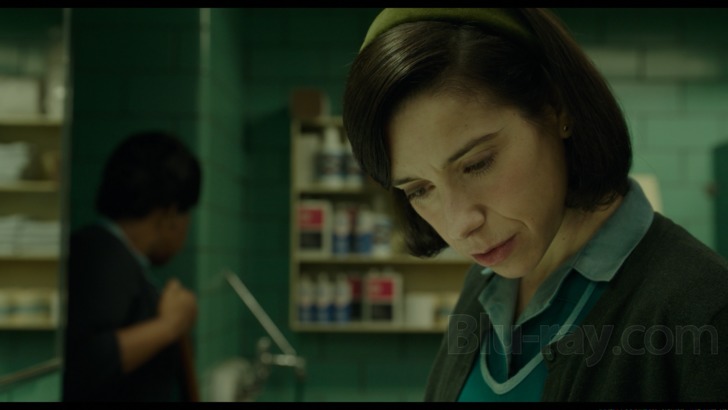
The same magical realism that brought Franco’s Spain so vividly to life in The Devil's Backbone and Pan's Labyrinth is put to superb use in The Shape of Water, albeit aimed at an early sixties United States where everything from Jell-o to Cadillacs augurs a bright, happy future, especially for “normal” (meaning straight and white) males. If the perceived paradigm in this “reality” is a serene suburban life with a spouse and kids, there’s another “reality” that the film dwells in for much of its running time: a dowdy (but fascinatingly so, due to the film’s incredible production design) urban environment in a neighborhood that has probably seen its best days long ago. Above a movie theater which is kind oddly playing The Story of Ruth (more about that in a moment), a mute (but not deaf) woman named Elisa Esposito (Sally Hawkins, Academy Award nominated for this performance) lives in an apartment that would have been quite at home (so to speak) in Dark City. Elisa has a seemingly unbreakable morning routine which involves making hard boiled eggs, checking her calendar and (in just one of this film’s kind of cheeky asides) pleasuring herself sexually.
Elisa’s routine also involves getting to work at the Occam Institute (more about that in a moment) just in the brink of time, usually being upbraided by her sweet if no nonsense co-worker Zelda (Octavia Spencer, Academy Award nominated for this performance). Elisa and Zelda are part of the cleaning staff (they evidently seem to be the entire cleaning staff) at this remote top secret facility that has no defined purpose within the context of the film, other than that it becomes home for a really top secret “asset”, which turns out to be this film’s Creature (Doug Jones). This so-called Amphibian Man has been wrested from his native waters in South America and brought to this concrete prison by a martinet military guy named Colonel Richard Strickland (Michael Shannon, who should have been Academy Award nominated for this performance). Strickland is a hard nosed type who thinks the Creature is obviously subhuman, but who also believes that the Creature’s anatomy may give the United States a leg up on the Soviets for the then nascent space race (this particular element may not be the most convincing in a film already flirting pretty deliberately with suspension of disbelief).
The mute Elisa manages to make a connection with the Creature, and they begin a halting “relationship” built largely around Elisa providing the Creature with hard boiled eggs, as well as introducing him to the blandishments of recorded music. Meanwhile, Strickland is arguing to his higher ups that the only way to get the goods on what the Creature may be able to provide is to kill him and dissect him, something that pushes Elisa to take some desperate measures which involve her, Zelda, and Elisa’s gay advertising illustrator neighbor Giles (Richard Jenkins, Academy Award nominated for this performance). Another subplot involves a scientist at the Occam Institute, Dr. Robert Hoffstetler (Michael Stuhlbarg), who, unlike Strickland, is arguing rather vociferously for saving the Creature, albeit perhaps not for completely noble reasons, since it's revealed he's actually a double agent working for the Soviets.
Even this brief summary probably already might raise some eyebrows from film fans unaccustomed to such a provocative set of characters and plot elements. But del Toro, never one to suffer from restraint, goes for the gusto in any number of ways in terms of both subtext and presentation. The film is a near hallucinatory experience at times, filled with sickly greens and yellows and of course focusing fairly relentlessly on water imagery. But del Toro also invests the tale with several quasi-musical or (in one case) outright musical elements, another stylistic conceit that could have easily tanked (no pun intended, considering where the Creature is kept for much of the film) with a less skilled director. A number of other elements are flat out bizarre, but always tailored to one of the film’s central messages, namely “who exactly are the ‘freaks’ in this story?”. That comes into play not just with regard to the mute Elisa and her love for an amphibian, but also with regard to Giles, who has a crush on a (male) neighborhood pie shop employee, or even with regard to the supposedly “normal” Strickland, whose sexual tastes are decidedly on the kinky side. The whole Cold War ambience is played fairly comedically at times, largely with regard to Hoffstetler’s subplot.
The film often ping pongs back and forth between comedy and pathos, and kind of incredibly manages to do so without losing control of the tonal rudder. There are some throwaway gags here, as in a close-up of Zelda dusting some object in the Occam Institute, which, once the camera pulls back, turns out to be an absolutely mutant sized turbine of some kind, one whose surface area is so improbably large (and unreachable) that her cleaning efforts are obviously absurd. Other sequences, as in the almost Keystone Kops-esque scene where Elisa facilitates the Creature’s escape from the Occam Institute, have outright slapstick tendencies mixed with considerable, near Hitchcockian, tension. There's no doubt that the bad guys in this piece are played like cartoons, but at least in the case of Strickland, they're kind of scary cartoons.
There are some oddities afoot (webbed or otherwise) here, though. That aforementioned use of The Story of Ruth seems a little odd, since the story doesn’t exactly involve content that seems genuinely linked to the proceedings, unless one accepts the Jews in the tale as “freaks” of some sort. And what of the Occam Institute? “Occam’s razor” of course postulates that the “simplest” answer to any conundrum is probably the right one, which seems a bit more on point with regard to elements like Strickland’s dismissal of South American natives feeling that the Creature was some kind of Divine Being (guess how that one turns out). But of course it can be argued that nothing is ever totally “simple” in a del Toro film. (For one salient example, pay attention to a superb "reveal" in the closing moments of the film regarding scars on Elisa, and then ponder what the denouement may suggest about her parentage.) What The Shape of Water makes so devastatingly clear is that del Toro can tell an elaborate tale with the wide eyed wonder of a child. The result for this particular viewer was “simply” moviemaking magic.
The Shape of Water Blu-ray Movie, Video Quality 
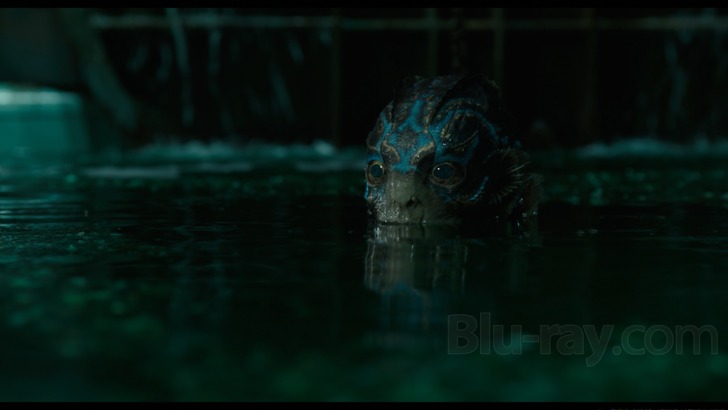
The Shape of Water is presented on Blu-ray courtesy of 20th Century Fox Home Entertainment with an AVC encoded 1080p transfer in 1.85:1. Fox continues to be on a roll with its recent high profile Blu-ray releases, and this is another stunning looking transfer, one that preserves Dan Laustsen's evocative Oscar nominated cinematography. While things were digitally captured (and finished at a 2K DI), there's a somewhat more "traditional" cinematic look here at times, with an emphasis on a somewhat deeper, more textured appearance than can typically be the case in the sleek, flat world of the Arri Alexa. The film's Oscar winning production design looks fantastic in high definition, with everything from the both slimy and ridged body of the Creature to the plush fabrics of Giles' apartment brought vividly to life, with excellent detail and fine detail levels. Shadow definition remains surprisingly strong despite stylistic conceits like the noir-ish lighting for several scenes involving Hoffstetler, or the kind of miasmatic haze that accompanies some of the water imagery. Del Toro and Laustsen opt for extreme close-ups quite a bit of the time, and fine detail on elements like facial pores is typically outstanding. The omnipresent grading of the film tends to be somewhat bifurcated, either tipped toward the green-teal side of things or, alternately, a warmer golden look that is typically utilized in both Elisa's and Giles' apartments. Despite the image sometimes being slathered in "artificial" tones, detail levels remain appealingly high. The surplus of shots taken either through or actually underwater, often with backlighting, lead to some very brief and minor flirtations with banding, but some moments, like the film's final fade out, seem to be deliberately skewed toward more abrupt gradations of tones, almost as if a silent film iris were slowly closing and altering the looks of things. There is one fairly brief black and white sequence toward the end of the film (see screenshot 19), where gray scale looks very nice and blacks are impressively deep.
The Shape of Water Blu-ray Movie, Audio Quality 
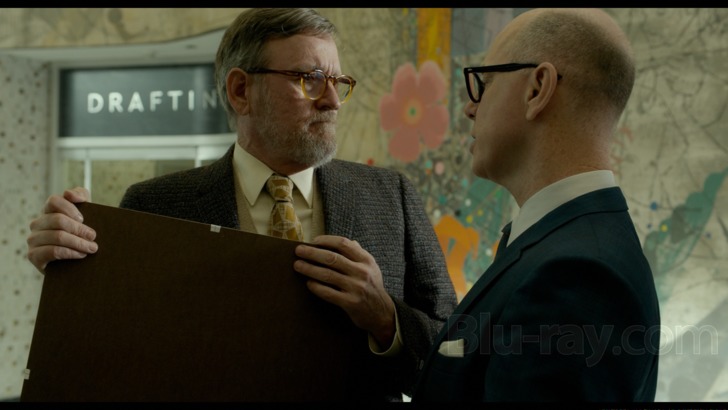
The Shape of Water's DTS-HD Master Audio 5.1 track is consistently engaging, offering an appealing wide soundstage for Alexandre Desplat's Oscar winning score, as well as providing good immersion (sorry, couldn't help myself) in a number of sequences like the escape scene where surround activity is near constant and rather impressive. Ambient environmental effects play a rather large part here, especially once "the rains" start, and there's a nice wash of sound that regularly fills the side and rear channels. Dialogue is always presented cleanly and clearly.
The Shape of Water Blu-ray Movie, Special Features and Extras 
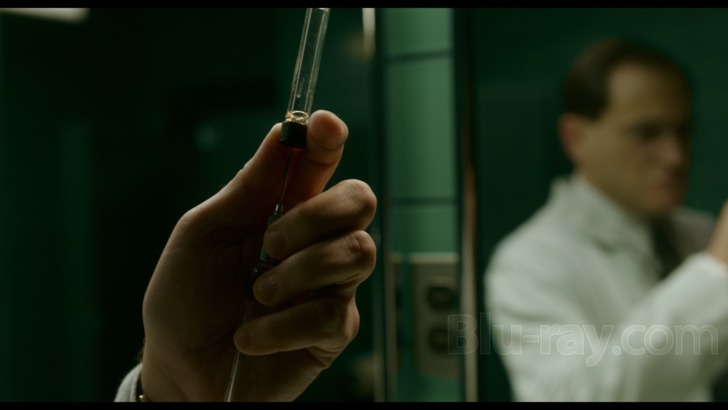
- A Fairy Tale for Troubled Times (1080p; 28:55) is a four part EPK which has some really good interviews and fun behind the scenes footage (it's kind of fun to see del Toro spending time on things like showing one actor how to open an umbrella). This covers a number of production elements including special effects and scoring.
- Anatomy of a Scene: Prologue (1080p; 3:14) features del Toro discussing things like storyboards and transitions, but actually has quite a bit of footage from scenes other than the prologue.
- Anatomy of a Scene: The Dance (1080p; 4:50) again ventures outside of this particular sequence in terms of some of the clips shown, but does include some behind the scenes footage of the dance sequence being rehearsed and shot.
- Shaping the Waves: A Conversation with James Jean (1080p; 5:05) is an interesting interview with the artist and illustrator.
- Guillermo del Toro's Master Class (1080p; 13:27) is a nice Q & A session with del Toro and some other crew members held at the Zanuck Theater.
- Theatrical Trailers (1080p; 6:55)
The Shape of Water Blu-ray Movie, Overall Score and Recommendation 
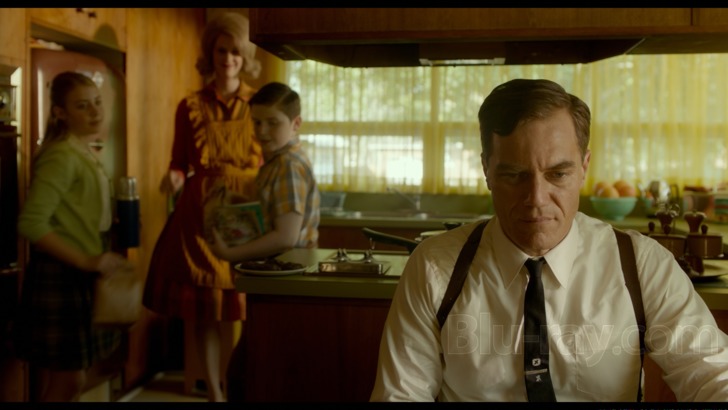
If you see only one film about a mute cleaning woman in love with an amphibian this year, I must insist you make it The Shape of Water. That, of course, is said with tongue planted firmly in cheek, but this is a rare film that dares to be almost willfully different, but which still manages to connect inerrantly with its audience on both intellectual and emotional levels. Fox has offered another disc with top flight technical merits, and it's probably no great surprise that The Shape of Water comes Highly recommended.
Other editions
The Shape of Water: Other Editions

The Shape of Water 4K
2017

The Shape of Water
with Atom Movie Money
2017

The Shape of Water 4K
2017

The Shape of Water 4K
2017
Similar titles
Similar titles you might also like

Pan's Labyrinth
El laberinto del fauno
2006

Moonrise Kingdom
2012

Tale of Tales
2015

Foyle's War: Set 8
2014

The Master
2012

Jane Eyre
2011

Wuthering Heights
2011

Far from the Madding Crowd
2015

My Cousin Rachel
2017

Brokeback Mountain 4K
2005

Allied 4K
2016

The Scarlet Empress
1934

Phantom Thread 4K
First pressing in clear case
2017

The Artist
2011

Women in Love
1969

Anna Karenina
2012

The Handmaiden
아가씨 / Ah-ga-ssi
2016

The Deep Blue Sea
2011

The Reader
2008

Great Expectations
2012